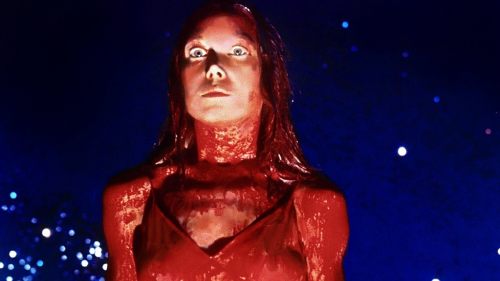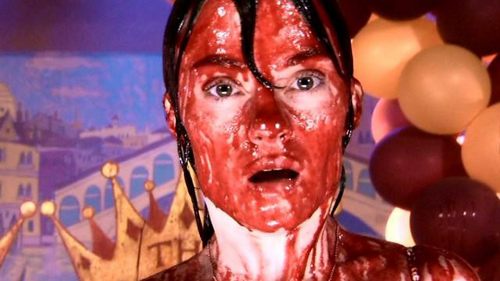CARRIE: The Original (And Best) Mean Girls Horror Movie
De Palma is out in theaters now (you can buy your tickets here). In honor of the documentary's legendary subject, we're kicking off a week-long look at the director's classic - and not so classic - films.
Carrie is the most bizarrely perfect hybrid - equal parts teen and horror movie that could be read either way and functions eloquently as both. If the popular kids went on to have their story told in Mean Girls, then Carrie's descendant(s) had theirs in The Craft. But here everything is folded together into a strangely potent mixture that shouldn't work nearly as well as it does.
That it works at all is thanks primarily to Brian De Palma, a filmmaker at the top of his game who, partly due to budgetary delays, was allowed more time than usual to ruminate on Stephen King's source text. As a result, there isn't a moment of the movie that is out of place or a throwaway.
Carrie's control mirrors De Palma's throughout, as he takes his time to slowly establish the central conceit (unlike the remake, which showed her covered in blood on the goddamn poster) with a shattered mirror here, a flipped ashtray there. Much of Carrie's strength comes from its very deliberate structure, jumping between regular, horrid teen life and the very lonely, abusive home life of its protagonist, under the rule of her crazed mother. Their arguments may be loaded with religious posturing, but they're rooted in painfully normal mother-daughter conflicts. Carrie's mother's cruelty in suggesting her date might not even show up, never mind outright saying they're all going to laugh at her when she gets to prom, is something many weird kids (myself included) will recognize. Think of that flash of lightning when she questions simply 'prom?' as though the concept alone is otherworldly. Carrie so desperately wants to be normal, but she is consistently shunned by her classmates who we first see picking on her for being meek and not particularly sporty, and her mother, who refuses to hold her when she returns home visibly upset. Hell, the principal doesn't even care enough to get her name right.
De Palma establishes a very realistic high school setting from the outset, which lends itself well to the unfolding horrors, especially as the teachers and pupils are, mostly, fleshed-out characters. Classroom sequences feel very normal and everyday, the bantering while shopping for tuxes is natural - it's easy to imagine this world ticking along without the cameras.
Take the movie's two most infamous sequences - the shower incident and the Grand Guignol finale at the Prom, which represent the very different, yet interlocking, stories being told here. The tampon scene is arguably one of the most shocking, and realistic, representations of bullying in movie history. From the close-ups, toggling between Carrie's wide eyes and her bloody fingers, to the infamous 'plug it up' refrain, the whole sequence is played exactly right - horrifying, humiliating and heartbreaking in the extreme.
It also introduces Chris, at the forefront, her eyes gleaming in much the same way her glossy lips will later as she licks them, hungrily, while setting Carrie up. The ultimate mean girl, Chris is self-righteous, entitled, vain, nasty, ruthless. Even without her army of skanks, she's powerful thanks to a vaguely abusive, and easily manipulated, bad-boy suitor who's only too willing to do her dirty work.
Prom is, of course, the most heartbreaking sequence (lengthy too, clocking in at a good twenty minutes) because Carrie is set up for such a spectacular fall. De Palma opts for a rosy glow as her peers act genuinely kindly towards her, and Carrie glides up onto the stage, in slow-motion, to bask in the glow of acceptance. In another universe, this would be a triumphant end, and penance for one of the girls who hurt her. But, as that streamer falls to show exactly where the bucket is, an overwhelming sense of dread descends as Carrie's fate becomes all too clear to everyone but her.
It's in her final moment on stage, too, when she lets loose, that De Palma joins her, the screen finally turning blood red as it's been threatening to do throughout the movie. Even when things go to hell, his focus is still razor-sharp, the balancing act between teen movie and horror perfected in a final moment of deadly triumph over adversity.
Carrie is a timeless story, and one to which most of us can relate. De Palma quietly builds suspense by showing us little glimpses of Carrie's powers while simultaneously letting us know that the bullies are out to get her in a big way. His understanding, and expert handling, of the material is perhaps best showcased by the unnecessary, toothless 2013 remake which scuppers the two most well-known sequences, while simultaneously robbing the movie of bite or edge. There's a subtlety to the narrative that was entirely absent in the remake, in favour of deadened, dull pessimism. Where De Palma trusted in building the tension slowly, Kimberly Peirce, working as she was to enrapture a modern audience, hammered every point home - from Carrie's powers to her mother's mania.
Referenced in everything from Never Been Kissed - where Drew Barrymore is pelted with eggs in her prom dress, and the bullies later fall victim to much the same fate - to its ill-advised remake, De Palma's seminal shocker is yet to be surpassed for its honest, unflinching treatment of teen girl (or, rather mean girl) issues. Neither cynical nor idealistic, just brutally honest, De Palma captures the horror of being a teenage girl with the difficulties in being different and melds the two ideas together until we're not sure where one ends and the other begins. If there's a more horrifying representation of teenage cruelty in cinema than the pig's blood dumped on Carrie's head, we've yet to see it. It's one of the greatest set-pieces in film, never mind horror, and it brilliantly encapsulates the titular character's weakness and power in one fell swoop.
Although De Palma is the ideal fit for such a cruel, cautionary tale, without Sissy Spacek, it'd be difficult to care about half of what happens in this movie. Spacek's unconventional beauty is perfect for Carrie White because, far from needing a Breakfast Club-style makeover, she's odd looking but not intentionally, hiding beneath sheaths of rather lovely blonde hair.
The sweet, plaintive theme captures her innocence, but it could easily have been borrowed from a sugary rom-com where Carrie eventually comes out of her shell and nabs the guy at the end - something De Palma, naturally, sets up in the final act only to tear it down.
It's this balancing of opposing themes, and indeed tones, that marks Carrie out as such a unique movie. Rather than just focusing on the horrors of being different, or the horrors of high school, or the horrors of being able to kill people with one's mind, De Palma tackles all three and then some. And, to his immense credit, it never feels like he's juggling.



